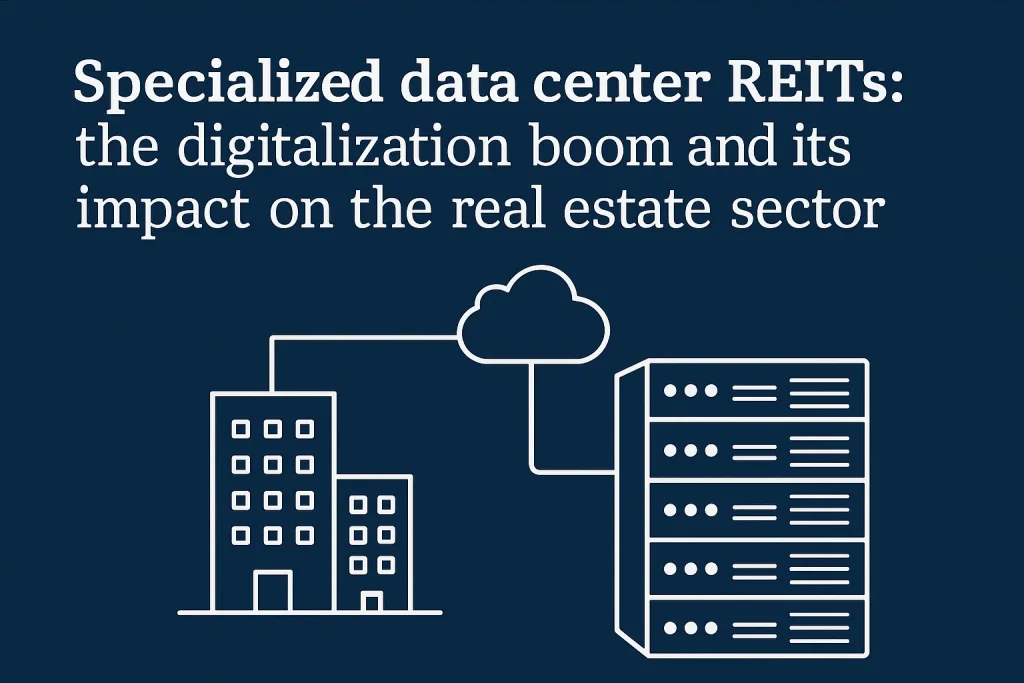The digital landscape has significantly reshaped how businesses operate, leading to a surge in investments in data centers. This transformation is having a profound impact on various sectors, most notably the real estate industry. Specialized data center REITs have emerged as a focal point in this digitalization boom, as they provifinvde the infrastructure necessary to support the growing demand for data storage and processing capabilities.
With the rapid increase in online activities, companies are looking to expand their digital infrastructure. This is where specialized REITs come into play, offering unique opportunities for investors and transforming traditional real estate markets. Understanding how these developments are influencing real estate can provide valuable insights for potential investments.
The rise of specialized REITs in the digital era

Specialized REITs have become vital in meeting the needs of the growing digital economy. These entities focus on acquiring, managing, and leasing out spaces specifically designed for housing data centers. As the demand for cloud computing, streaming services, and online applications continues to grow, so does the need for advanced data storage solutions.
Due to the heightened demand, these niche REITs are experiencing unprecedented growth. Businesses continuously seek data solutions to enhance the reliability and speed of their digital services, which in turn fuels the development and expansion of dedicated real estate assets. This trend is not only reshaping the real estate sector but also providing lucrative opportunities for investors seeking growth in specialized markets.
Factors driving the demand for data center spaces
Several factors are actively propelling the need for increased data center capacities across the global digital economy. The sustained reliance on digital ecosystems requires robust and scalable infrastructure to handle the exponential growth in data.
First, as more businesses migrate operations to digital platforms, there’s a massive surge in data accumulation, necessitating reliable and robust storage solutions. This transition is no longer optional but a fundamental requirement for operational continuity, performance, and competitiveness across nearly all market sectors. Companies are generating, collecting, and processing vast quantities of information from customer interactions, transaction logs, and operational telemetry, all of which must be housed securely and be instantly accessible.
Additionally, the advent of transformative technologies such as IoT (Internet of Things) and AI (Artificial Intelligence) is creating an ever-growing pool of data that requires effective, high-speed management and storage at the network edge. AI models demand immense computing power and massive datasets for training and real-time inference, driving the demand for high-density compute facilities. IoT devices, meanwhile, generate continuous streams of data that necessitate local processing capacity to minimize latency.
Moreover, the recent global pandemic has significantly accelerated digital transformation, with remote working and online communications becoming the norm. This profound behavioral shift has resulted in vastly increased bandwidth requirements and a critical need for resilient, low-latency IT infrastructures that can guarantee business continuity regardless of external disruptions. Data center REITs (Real Estate Investment Trusts) offer the scalable and flexible solutions that these evolving scenarios demand, providing ready-to-deploy, secure space and power. They play a vital role in ensuring that businesses can meet their current and future technological needs efficiently and reliably.
How specialized REITs transform real estate
The influence of data center-focused REITs extends beyond their immediate industry. By establishing cutting-edge facilities in strategic locations, they not only increase property values in those areas but also stimulate local economies through job creation and infrastructure development.
As digital transformation continues to accelerate, real estate professionals are recognizing the value of investing in technology-centric assets. With tensions over urban space availability for conventional real estate, data centers present an unprecedented opportunity to optimize land use by developing vertical storage solutions and innovative energy management.
Strategies for investing in digital infrastructure
Investors looking to tap into this burgeoning market of digital infrastructure should consider several strategic approaches to maximize returns and mitigate inherent risks. Understanding current market trends and committing to thorough due diligence is crucial for making sound investments.
The analysis of sector-specific factors is fundamental. By analyzing factors such as location (proximity to key metropolitan and networking hubs), regulatory environments (data privacy laws and energy constraints), and technological advancements (adoption of liquid cooling or sustainable power sources), investors can make informed decisions on potential REIT acquisitions. Data center demand is driven by the migration of businesses to digital platforms and the exponential growth of data generated by IoT and AI. Investing in REITs located in high-demand markets and that demonstrate technological leadership is vital for long-term growth.
Diversification is also a key strategy in mitigating risks associated with technological changes and market volatility. The data center market, although growing, is sensitive to security failures and rapid changes in technology. By including data center REITs in a broader investment portfolio, individuals and entities can take advantage of both the stability of underlying real estate values and the high growth potential of digital infrastructure markets. This diversification protects the portfolio against the specific risk of a single sector, while still capitalizing on the dominant trend of global digital transformation. Therefore, a balanced approach, combining deep analysis with diversification, is the backbone of a successful investment in this expanding sector.
Conclusion: Embracing the digital real estate shift
The shift towards a digital economy is redefining traditional real estate paradigms. Data center REITs are at the forefront of this change, playing a critical role in supporting technological advancements and offering viable investment opportunities. As digital footprints expand, embracing this evolution is essential for real estate stakeholders.
Understanding the impact of digitalization on real estate and investing wisely in forward-looking assets can lead to sustainable growth and success. As companies continue to prioritize digital infrastructure, specialized REITs offer an exciting prospect for those willing to embrace the future of real estate investments.



